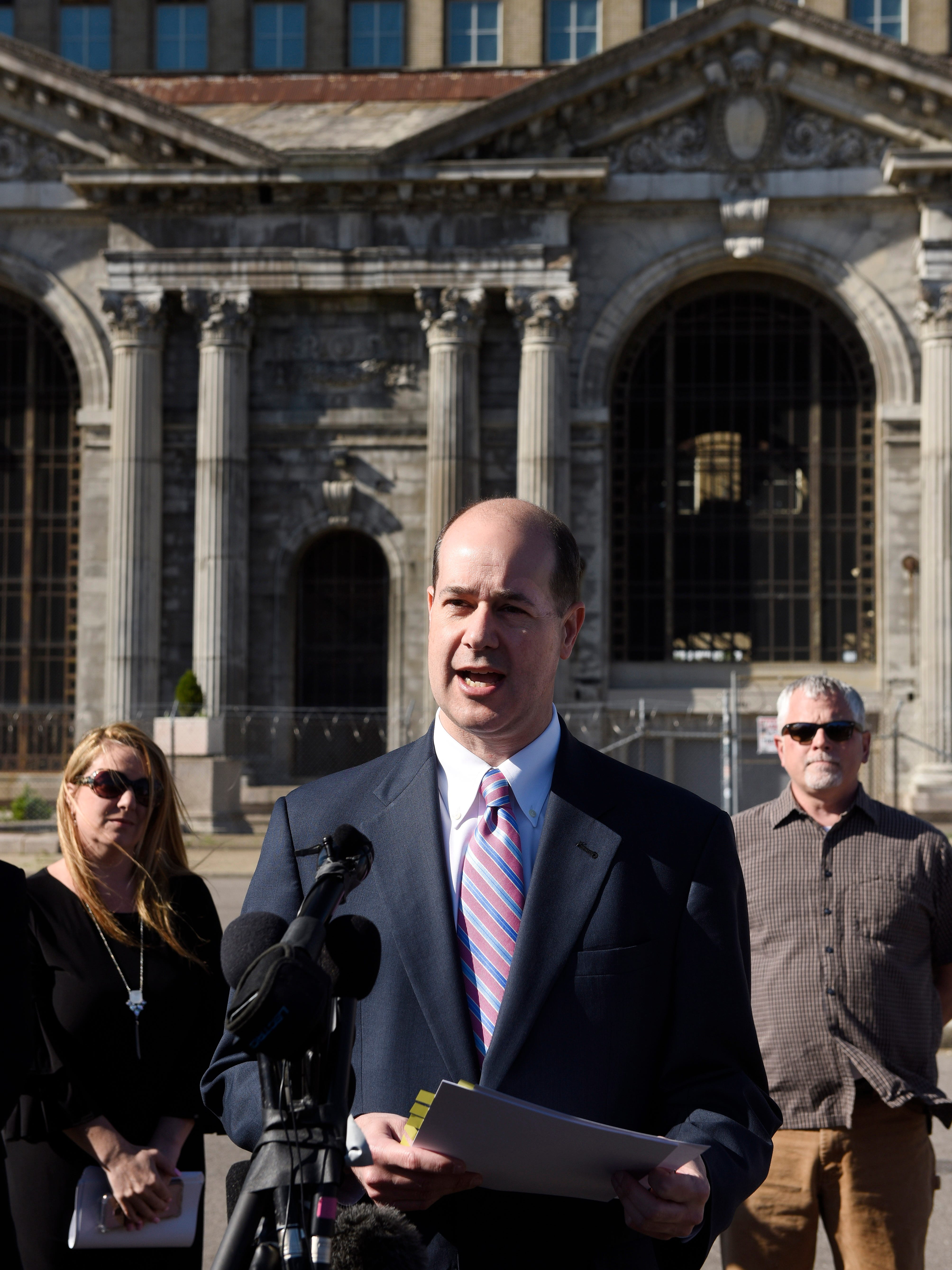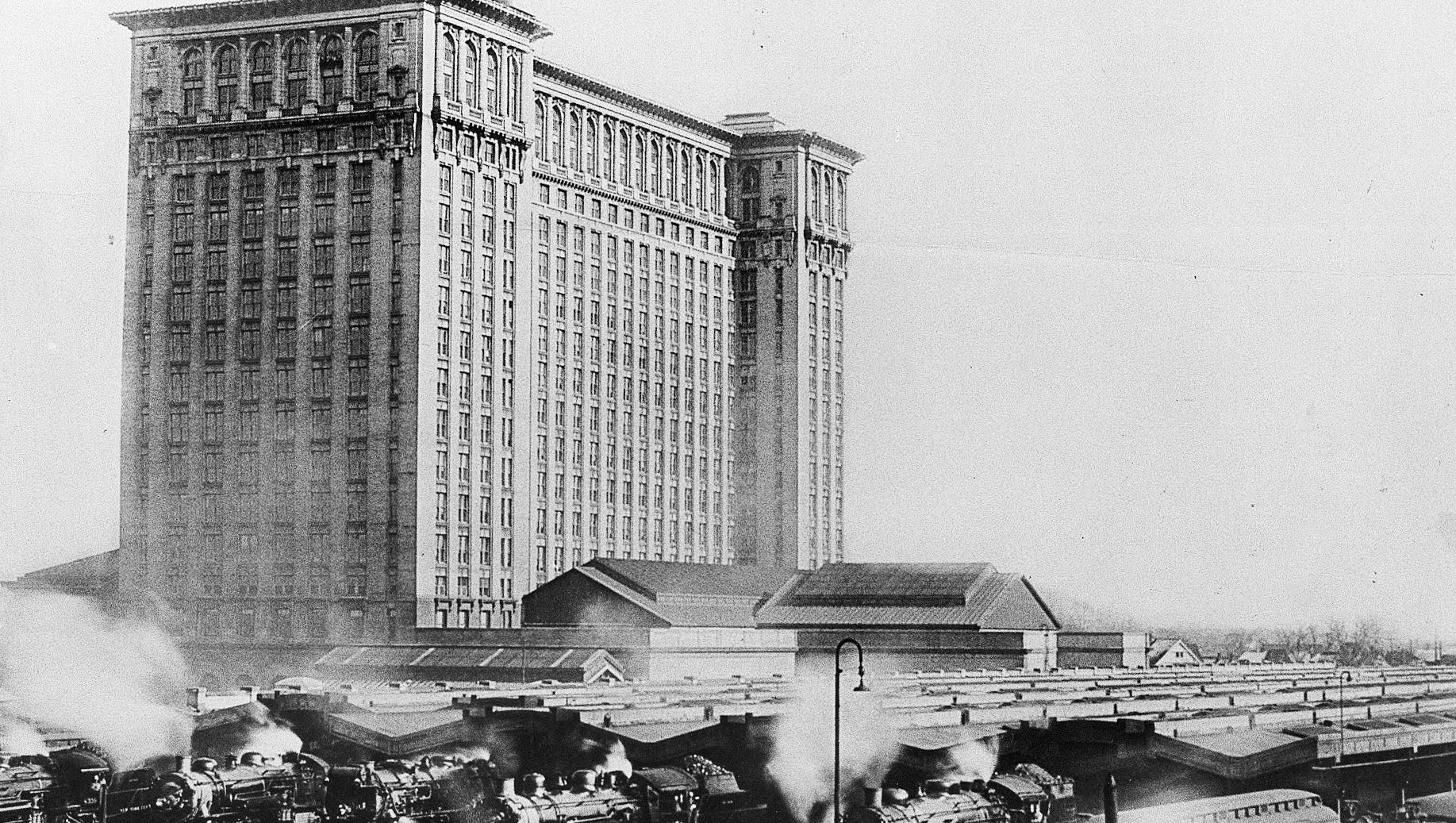Ford depot purchase could give new life to symbol of Detroit's decline

Detroit – Henry Ford forged 20th-century Detroit with the company he founded 115 years ago – and now the Blue Oval aspires to shape the future again with its planned revival of the long-vacant Michigan Central Depot.
Ford Motor Co. envisions renovating the historic 18-story, 500,000-square-foot building to anchor a new Corktown campus. It gives the automaker a hub near downtown, would add hundreds of employees to the neighborhood, and resurrects one of the largest symbols of Detroit's fall from glory.
It's an ambitious plan with no recent precedent. The building has sat empty for 30 years and is derelict. And the automotive technologies that Ford intends to test and develop has yet to find a market with consumers around the world.
Details are sparse. Executive Chairman Bill Ford Jr. and Ford leadership will talk about their plans for the blighted building June 19. Part of that event, billed as a celebration, will be open to the public.
More:From the archives: Searching for R. Kelley
More:From the archives: Frozen in indifference
Matthew Moroun, heir to his father's transportation and logistics businesses, said at a Monday press conference in front of the structure his family acquired in 1992 that Ford is now the outright owner of the building and the adjacent book depository.
"The future of the depot is assured," Moroun said. "The Ford Motor Co.'s Blue Oval will adorn the building."
Ford spokesman Said Deep, who watched the announcement from behind a scrum of media, said, “This is an exciting time for the city and an exciting time for Ford. We look forward to sharing our plans for Michigan Central Station and for Corktown."
Multiple sources have said the train station and the adjacent book depository building that was part of the purchase will be key parts of Ford's goal to create a campus in Detroit. Ford has been amassing properties in Corktown to form a hub for its self-driving and electric vehicle divisions.
The automaker sent invitations Monday to the June 19 event, promising, "It will be a historic day for Detroit, the auto industry and the future of Ford – the start of a new era of innovation and mobility."
Sources have said the program – which begins at 11 a.m. – will be open to the public, but space is limited. Crews unloading big speakers and sound equipment Monday morning said they were getting ready for a program "next week."
Some are already celebrating the changing of the guard at the historic building.
"This will change the narrative of our city," said Dan Austin, local author and founder of HistoricDetroit.org. "That building was plastered on every story about the bankruptcy. Beyond the new income tax, beyond the change to the skyline, beyond all that stuff, this one building almost single-handedly will change the way the world looks at Detroit."
Moroun did not disclose the sale prices of the train station or book depository, calling them a private matter.
The Detroit News previously reported documents posted briefly online indicated the book depository sold for $8 million. The document on which that dollar amount was listed has since been removed. There was never a dollar amount listed on public records for Michigan Central Depot.
Ford's operations will remain centered in Dearborn. Officials have not said what the company plans to do with the Corktown buildings, but multiple sources familiar with the situation have said the Corktown project will be an addition to its planned 10-year-long renovation of its Dearborn campus. It won't replace Ford's plan there, nor will Ford leave Dearborn for Corktown.
Some of the estimated $1 billion needed for the Dearborn project will be reallocated to fund the renovation of the train station and ancillary Ford development in Detroit.
When the renovation is finished, Ford will locate some employees in Corktown. Ford could potentially rent space in the building to other companies, according to a source familiar with the situation.
The company hopes Corktown and the former train station can give it urban credibility with young technology workers who might otherwise go to work in Silicon Valley or other attractive technology centers.
Matthew Moroun said Monday his family has been courted by multiple would-be buyers in recent years, but they wanted a buyer with a grand plan. Ford officials have been in discussion with the Morouns since October, he said.
His father, Manuel "Matty" Moroun, was absent from Monday's presentation. The 91-year-old has rarely made media appearances throughout his career, and Monday was no exception. Company officials declined to make a public comment.
Detroit Mayor Mike Duggan said Monday that the renovation and reuse of the building is yet another shot in the arm for the city.
"We’ve seen huge numbers of people move into this city and lots of businesses move into this city. What we’ve been hurt by is families with children moving out,” he said. “There’s no doubt this is going to have a major impact, but I’m going to leave those discussions for Ford.”
Duggan and Ford representatives declined to discuss or confirm any tax incentives that come with Ford's pending renovation of the building. Federal tax credits are available for historic restorations.
Detroit developer Dan Gilbert recently got an estimated $300 million in tax subsidies from a brownfield program created last year by the Michigan Legislature. Gilbert's deal takes up about 38 percent of the $800 million that could be awarded to brownfield developments. The Michigan Senate also is considering a bill that would offer tax credits for developers to spend on renovations.
Moroun on Monday thanked Duggan for his help "running the back channels" with negotiations. Duggan previously told The Detroit News he'd been working on the deal for a long time.
"The Morouns felt that they had hung in there and wanted to develop the train station themselves, and could probably have made significantly more money taking their time and developing it themselves. But we had some real candid conversations about an opportunity for the future of this city,” Duggan said.
Along with the Morouns' ownership of the Ambassador Bridge — and their long and costly battle to stop the planned Gordie Howe International Bridge — the image of the family in Detroit has long been tied to the ownership of the empty station.
Michigan Central Depot opened in 1913 and closed permanently in 1988. Its main waiting room, meant to resemble an ancient Roman bathhouse, has marble floors and 54-foot ceilings. Weather and scavengers have so thoroughly degraded the structure that it’s been the setting for such apocalyptic Hollywood movies as “Transformers” and “The Island.” It was designed by the same architects who created New York's Grand Central Terminal.'
In 2009, Detroit City Council passed a resolution ordering the Morouns to demolish the depot. The family ignored the request.

The former book depository building, at 2231 Dalzelle, is also known as the Roosevelt Warehouse. It was designed by famed architect Albert Kahn. Earlier this decade, the city declared the former warehouse a dangerous structure and took legal steps to have it demolished. The issue was settled this year.
ithibodeau@detroitnews.com
Twitter: @Ian_Thibodeau
Detroit News staff writers Christine Ferretti and Jennifer Chambers contributed.